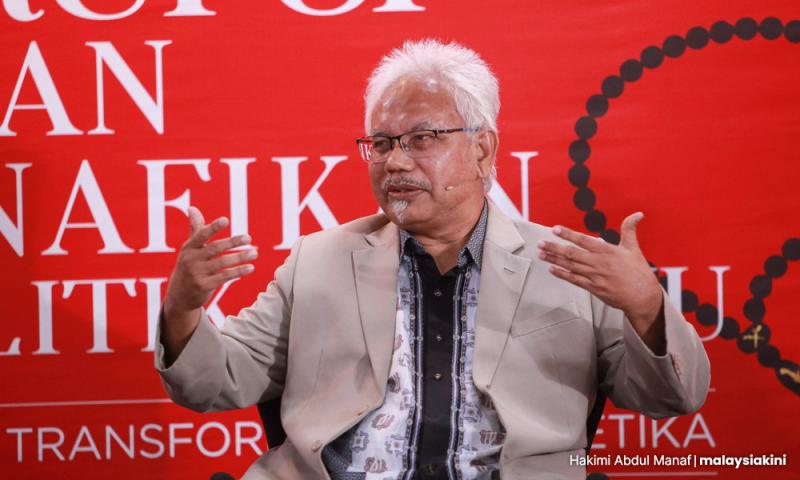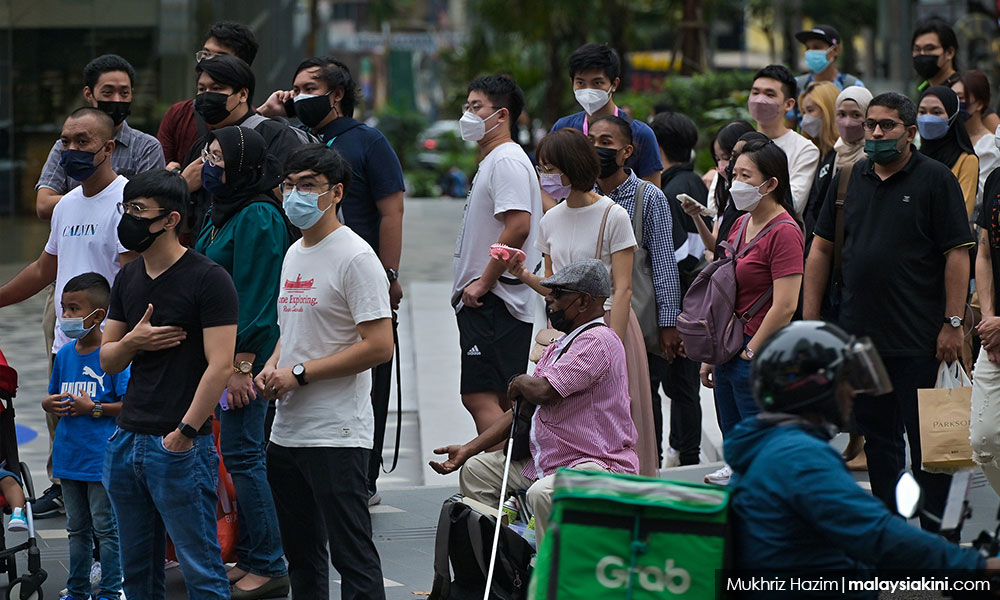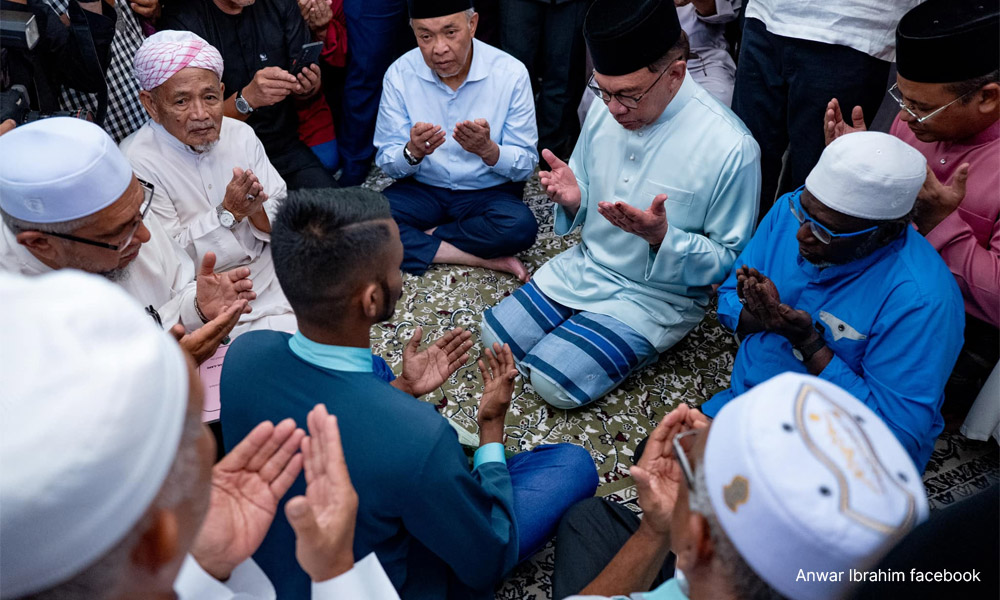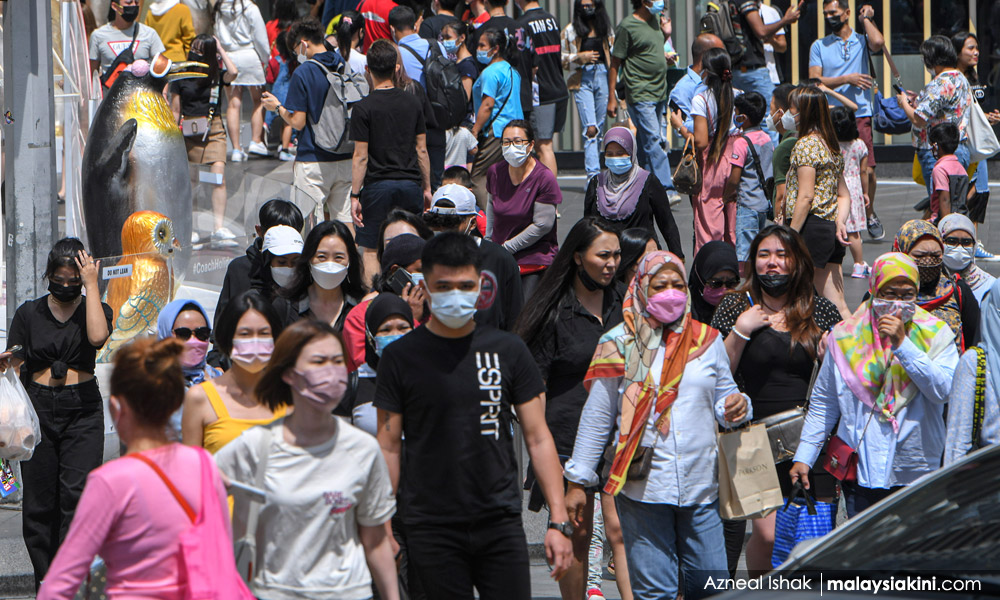
Race relations: It takes two hands to clap, says academic
RK Anand
Published: May 9, 2024 7:50 PM
From retail stores to even fried chicken, disputes concerning race and religion appear to permeate the length and breadth of the nation, threatening to undo its multiethnic and multireligious social fabric.
Acknowledging that trials and tribulations are part of evolution, academic Tajuddin Rasdi however warned that the situation would get “darker”.
In a previous podcast, the professor of architecture observed how Malay-Muslims have developed a siege mentality because of dwelling in silos, resulting in what he termed as the “tempurung or coconut shell mindset.”
However, he also opined that non-Malays have failed to respond in a “strategic manner” thus exacerbating the situation.
When Malaysiakini spoke to Tajuddin regarding this, the UCSI university professor clarified he was not assigning blame.
“I am just being practical, and if I am wrong, I have no qualms apologising,” he said.
Describing himself as a “spiritual” Muslim and having read the scriptures of other religions, Tajuddin believes that in certain cases, silence could be the best option.
When pointed out that the non-Malays would perceive this as asking them to capitulate further, he replied: “Silence should not be confused with cowardice.”
“In some instances, silence can be a strength. Sometimes, the one who walks away from an argument is the better person,” he added.
In the absence of a “magic wand” to make this problem disappear overnight and with politicians viewing the situation through the lens of votes, Tajuddin asked if others could offer a better solution.
Regardless of colour or creed, he believes no Malaysian wished to witness a repeat of the May 13 incident.
Published: May 9, 2024 7:50 PM
From retail stores to even fried chicken, disputes concerning race and religion appear to permeate the length and breadth of the nation, threatening to undo its multiethnic and multireligious social fabric.
Acknowledging that trials and tribulations are part of evolution, academic Tajuddin Rasdi however warned that the situation would get “darker”.
In a previous podcast, the professor of architecture observed how Malay-Muslims have developed a siege mentality because of dwelling in silos, resulting in what he termed as the “tempurung or coconut shell mindset.”
However, he also opined that non-Malays have failed to respond in a “strategic manner” thus exacerbating the situation.
When Malaysiakini spoke to Tajuddin regarding this, the UCSI university professor clarified he was not assigning blame.
“I am just being practical, and if I am wrong, I have no qualms apologising,” he said.
Describing himself as a “spiritual” Muslim and having read the scriptures of other religions, Tajuddin believes that in certain cases, silence could be the best option.
When pointed out that the non-Malays would perceive this as asking them to capitulate further, he replied: “Silence should not be confused with cowardice.”
“In some instances, silence can be a strength. Sometimes, the one who walks away from an argument is the better person,” he added.
In the absence of a “magic wand” to make this problem disappear overnight and with politicians viewing the situation through the lens of votes, Tajuddin asked if others could offer a better solution.
Regardless of colour or creed, he believes no Malaysian wished to witness a repeat of the May 13 incident.

Be the bigger person
Stressing that it “takes two hands to clap”, Tajuddin said non-Muslims must also be more respectful of issues related to Islam, which is sacred and close to the heart of Muslims.
“For example when a Muslim politician raises something about Islam, don’t belittle him or her, or tell the person to focus on ‘more important’ things. The Muslims will interpret this as an insult,” he added.
Quizzed on Muslims insulting other faiths and in some cases, without repercussions, the academic said he was well aware of the situation.
“Please don’t get me wrong, I am not belittling the bitter experiences of the non-Malays. I know what Malays say about them and how they insult them. I can write a book on it.
“Then again, we need to ask if we should respond in the same way? If so, nothing will change. This is the hard truth we must face. When nobody makes an attempt and waits for the other, we are left with a stalemate.
“We need to be the 'bigger person'. If we think about tit-for-tat, then there will be no change and the situation will deteriorate to a point beyond repair and everyone will suffer.
“This is where patience is required until things change. If you hope for the other to make the first move, it would not happen,” he added, re-emphasising that there is no “quick fix” available.
Tajuddin also advised non-Malay politicians to let their Malay colleagues react to sensitive issues instead of coming out swinging to score points with their respective communities.
“When non-Malay politicians retaliate to some of these issues, it becomes ammunition for their Malay-Muslim political opponents,” he added.
He also urged politicians and other quarters to consult the authorities and seek proper clarification before “blasting their cannons”.
As an example, he cited some of the responses to the Education Ministry’s move to introduce the “Imam Al-Nawawi’s 40 Hadith” appreciation module with the aim of curbing extremism, which Prime Minister Anwar Ibrahim later clarified is not compulsory for non-Muslim students.
On the same note, he pointed to the backlash against Anwar for presiding over the conversion of an Indian Malaysian youth to Islam.
Stressing that it “takes two hands to clap”, Tajuddin said non-Muslims must also be more respectful of issues related to Islam, which is sacred and close to the heart of Muslims.
“For example when a Muslim politician raises something about Islam, don’t belittle him or her, or tell the person to focus on ‘more important’ things. The Muslims will interpret this as an insult,” he added.
Quizzed on Muslims insulting other faiths and in some cases, without repercussions, the academic said he was well aware of the situation.
“Please don’t get me wrong, I am not belittling the bitter experiences of the non-Malays. I know what Malays say about them and how they insult them. I can write a book on it.
“Then again, we need to ask if we should respond in the same way? If so, nothing will change. This is the hard truth we must face. When nobody makes an attempt and waits for the other, we are left with a stalemate.
“We need to be the 'bigger person'. If we think about tit-for-tat, then there will be no change and the situation will deteriorate to a point beyond repair and everyone will suffer.
“This is where patience is required until things change. If you hope for the other to make the first move, it would not happen,” he added, re-emphasising that there is no “quick fix” available.
Tajuddin also advised non-Malay politicians to let their Malay colleagues react to sensitive issues instead of coming out swinging to score points with their respective communities.
“When non-Malay politicians retaliate to some of these issues, it becomes ammunition for their Malay-Muslim political opponents,” he added.
He also urged politicians and other quarters to consult the authorities and seek proper clarification before “blasting their cannons”.
As an example, he cited some of the responses to the Education Ministry’s move to introduce the “Imam Al-Nawawi’s 40 Hadith” appreciation module with the aim of curbing extremism, which Prime Minister Anwar Ibrahim later clarified is not compulsory for non-Muslim students.
On the same note, he pointed to the backlash against Anwar for presiding over the conversion of an Indian Malaysian youth to Islam.

PM Anwar Ibrahim at the Indian youth’s conversion ceremony
Asked if it is appropriate for a prime minister, who represents people of different religions, to do so, he said: “The version I heard was that Anwar was at the mosque, and this youth wanted the ceremony to be memorable, so Anwar was asked to be a witness.”
“Anwar cannot say ‘no’. If it was me, I would not have rejected either because it is the responsibility of a Muslim (to do so),” he added.
On the racial and religious divide growing wider under Anwar’s watch, the academic mentioned two reasons for this - Perikatan Nasional’s constant harping on these two issues and “impatient non-Malays expecting miracles”.
“You cannot change the indoctrination of the Malays who were fed with ideas like the non-Malays are pendatang (guests) and opportunistic over a period of six decades by just snapping your fingers,” he said, pointing to Dr Mahathir Mohamad’s role in shaping this narrative but still commanding overwhelming support from non-Malays during his first tenure as prime minister.
Stand together
Tajuddin also suggested that when a particular community or faith comes under attack, non-Malays and non-Muslims should join hands and include Malays and Muslims as well.
“Anwar cannot say ‘no’. If it was me, I would not have rejected either because it is the responsibility of a Muslim (to do so),” he added.
On the racial and religious divide growing wider under Anwar’s watch, the academic mentioned two reasons for this - Perikatan Nasional’s constant harping on these two issues and “impatient non-Malays expecting miracles”.
“You cannot change the indoctrination of the Malays who were fed with ideas like the non-Malays are pendatang (guests) and opportunistic over a period of six decades by just snapping your fingers,” he said, pointing to Dr Mahathir Mohamad’s role in shaping this narrative but still commanding overwhelming support from non-Malays during his first tenure as prime minister.
Stand together
Tajuddin also suggested that when a particular community or faith comes under attack, non-Malays and non-Muslims should join hands and include Malays and Muslims as well.

He said it should not be a case of “Chinese or Christians responding to Chinese and Christian issues, Indians and Hindus responding to Indian and Hindu issues and so forth.”
“Rope in people like me. Those, who unlike politicians and certain academics, are not worried about votes or positions to make a united stand,” he added.
Tajuddin also appealed to the various non-Malay-Muslim NGOs to engage more Malay academics to hold forums and dialogues to address the concerns of their respective communities to foster better understanding instead of existing in echo chambers.
“These discourses will help break down the walls that separate us and allow the building of bridges,” he added.
Tajuddin suggested that the organisations could have even invited the firebrand Umno Youth chief Akmal Saleh to present his case against KK Mart.

Umno Youth chief Akmal Saleh
“Treat him with respect and then have a question and answer session. I am sure he would not be able to answer the questions and this would have shown the world if he is a ‘warrior’ or just a political opportunist,” he added.
According to the professor, the muftis should also play a more significant role, especially when politicians like PAS president Abdul Hadi Awang cite Quranic verses to justify caustic remarks.
“Who else can counter him if not the muftis? I know the Quranic verses but I don’t have the religious credentials,” he said.
As for social media, which is often blamed for fanning the flames of racial and religious tension, Tajuddin advocated stricter control because it is akin to “giving a box of matches to children.”
“You can argue about freedom of expression. But when you don’t have decorum and divide yourselves into pockets of race and religion, things tend to get out of hand.
“You don’t need an atomic bomb, social media can destroy Malaysia.
“Social media has robbed us of our humanity, compassion and respect for others. It has created a toxic environment, which is spilling out of the virtual world and polluting the real world,” he added, quipping that he too would be derided for his views after this article is published.
“Treat him with respect and then have a question and answer session. I am sure he would not be able to answer the questions and this would have shown the world if he is a ‘warrior’ or just a political opportunist,” he added.
According to the professor, the muftis should also play a more significant role, especially when politicians like PAS president Abdul Hadi Awang cite Quranic verses to justify caustic remarks.
“Who else can counter him if not the muftis? I know the Quranic verses but I don’t have the religious credentials,” he said.
As for social media, which is often blamed for fanning the flames of racial and religious tension, Tajuddin advocated stricter control because it is akin to “giving a box of matches to children.”
“You can argue about freedom of expression. But when you don’t have decorum and divide yourselves into pockets of race and religion, things tend to get out of hand.
“You don’t need an atomic bomb, social media can destroy Malaysia.
“Social media has robbed us of our humanity, compassion and respect for others. It has created a toxic environment, which is spilling out of the virtual world and polluting the real world,” he added, quipping that he too would be derided for his views after this article is published.

Boikot tetap boikot.
ReplyDeleteMfer, clap with our own two hands lah!
Delete